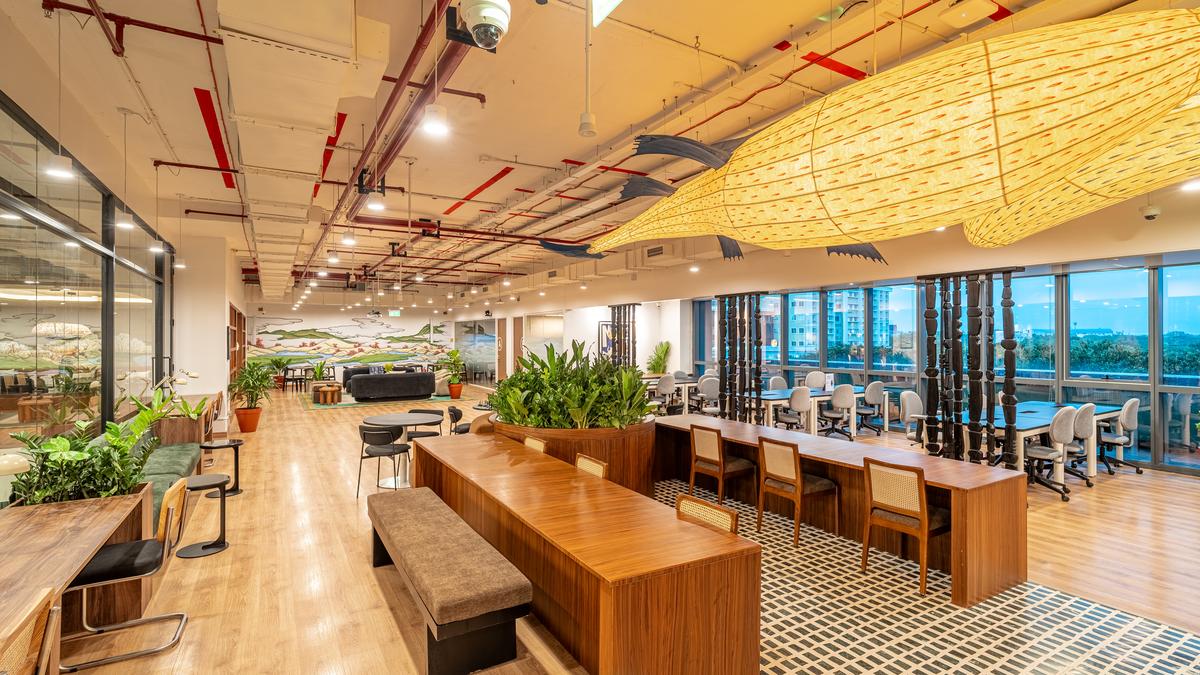
The changing face of workplaces
The Hindu
Growing trend of co-working spaces in Chennai and smaller towns in Tamil Nadu due to flexible work environment.
The number of seats at co-working spaces in Chennai has been increasing every month, reflecting the growing trend of companies, businesses, and individuals preferring a flexible workplace environment. Smaller towns in Tamil Nadu are also becoming attractive locations for co-working spaces. The demand for flexible office solutions is increasing in cities like Coimbatore, Madurai, Tiruchi, and Salem, too, thanks to the growing entrepreneurial ecosystems and significant investment. The companies in this space are investing in these cities now. Start-ups, micro, small and medium enterprises, information technology and manufacturing companies, Global Capability Centres (GCCs), traditional industries, and even students are choosing co-working spaces. The trend that peaked during COVID-19 thrives even after the pandemic subsided.
The reason is that the entry-level cost is minimal for co-working spaces, requiring no substantial deposits. These workspaces can be picked up for a day or a week. For a day, the charge varies from ₹500 to ₹1,200, depending on the space, location, and the required infrastructure like conference rooms and projectors. The monthly charges work out to ₹6,500-₹15,000 for a seat in a furnished centre with Wi-Fi, air-conditioning, and light refreshments. “The co-working space model allows businesses to adjust their space requirement easily, saving on capital expenses. It facilitates operation across multiple locations rather than at one place,” says Sanjay Chugh, city head-Chennai, ANAROCK Group. “When you hire a car, you go from point A to point B and get out. You don’t have to buy a car. Much like hiring a car for a trip rather than purchasing one, co-working provides a cost-effective, adaptable solution without long-term commitments,” he explains. He also notes that the big tech parks will continue to co-exist with the co-working spaces.
Today, local and pan-Indian co-working players open offices on Old Mahabalipuram Road, in the Tidel Park Area, at Anna Nagar, Adyar and Nungambakkam, and on Anna Salai in Chennai. According to Jerry Kingsley, Head, Strategic Consulting & Value & Risk Advisory, Jones Lang LaSalle (JLL), the co-working culture in Chennai started gaining popularity in the early 2010s. Some of the early players were Workafella, Hive, Regus, and iKeva. Data gathered by JLL show that the total supply in Chennai is over 1.4 lakh seats, spread across 4.7 million square feet, with 28% vacancy. The next major market is Coimbatore, where more than 16,000 seats were absorbed last year. Tiruchi and Tirunelveli are gaining momentum, though they have lower than 1,000 seats. The key players are Smartworks, WorkEZ, WeWork, Coworks, Cactus, Awfis, Symbyont, Table Space, and IndiQube.
Seeing the popularity of co-working spaces, the Chennai Metropolitan Development Authority (CMDA) is preparing to enter this market by establishing facilities at Anna Nagar, CIT Nagar, and Kolathur. These centres will be operational by December 2025. CMDA Member-Secretary Anshul Mishra says, “We are not competing with the private players. We are trying to bridge the gap for the low income groups, those who can’t spend much on office space. This will be on a par with any professional co-working space.”
There is an unorganised co-working market, too, with smaller operators renting out portions of their office or residential spaces. Builders are including co-working space/office space in their residential projects. “Many developers in other parts of India are doing this. And I also saw this design concept in one upcoming project in Chennai,” Mr. Chugh says.
Utkarsh Kawatra, co-founder, myHQ by ANAROCK, a co-working platform that helps people find and book workspace, notes that many coffee shops are renting out portions of their unused space for co-working. He says he receives at least 200 bookings a day from individuals seeking space on a daily basis. “Anyone who needs a 10-seater or a 500-seater now sees flex spaces as a good option. For teams of more than 200, it may not lead to direct cost-saving, but the ease of not getting capital locked in infrastructure and not making efforts at managing the spaces far outweigh the 10%-20% premium you may have to pay,” he adds.
Start-ups and clients The Hindu spoke to said investing huge capex in buildings while starting a business is always risky. So they pick up a few seats based on demand at flex spaces. Once the business grows, they opt for bigger spaces.













